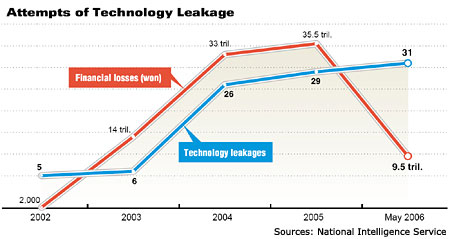|
By Kim Sue-young
Staff Reporter
``Among the boom businesses of the decades ahead, espionage will be one
of the biggest. Spies are not only here to stay, we are about to see
them industrialized, said American writer and futurist Alvin Toffler
of industrial spies.
Toffler made the remarks in his book, titled ``Power Shift: Knowledge,
Wealth, and Violence at the Edge of the 21st Century, published in
1990.
His remarks seem quite true in South Korea because of the increasingly high incidences of espionage and concomitant damage.
According to the National Intelligence Service (NIS), local
confidential information worth more than 95 trillion won (approximately
$102 billion) may have been leaked over the last four years.
Adding to this unreported cases, the estimated financial losses could reach as high as 100 trillion won, NIS officials said.
Prosecutors said they have uncovered 92 cases of industrial espionage since 2003.

Last month, nine former and incumbent employees of a local automaker
were arrested for selling core car assembly technology to a Chinese
company.
Prosecutors caught the criminals before the know-how was transferred,
but the estimated amount of loss, had it been leaked, would have been
about 4.7 trillion won on the Chinese market and 22.3 trillion won
worldwide.
Another large espionage case was reported late last month.
Source technologies of the portable Internet service called WiBro were
almost illegally transferred to companies in the United States.
Researchers of the WiBro developer enticed other workers to steal the technology in return for 180 billion won.
Had it been flown out of the country, the company would have suffered losses approximating 15 trillion won.
``A matter of grave concern is more industrial spies are becoming
involved with foreign governmental bodies where they steal information
systematically, an NIS official said on condition of anonymity. ``But
local companies have little understanding of security and little budget
to build more powerful security systems.
Why Do They Steal?
The increased leakages are mainly attributable to South Korea s advanced technology, experts said.
The NIS official said that whereas in the past the nation used to
imitate the technologies of developed countries its technologies are
now desired by other nations.
``Our companies particularly excel in information technology (IT), he said.
Another reason that employees sneak out confidential material is the
comparatively low wages given to science and engineering graduates,
said Choi Sung-woo, a member of the Scieng, a fraternity of those
majors.
``Researchers with masters or doctoral degrees in those fields tend to
make much less than financial firm workers, he said in an interview
with the Korea Economic Daily. ``They are not rewarded for their
efforts, he said.
According to KTjob, an online recruiting firm, 78 percent of 904
respondents said that they would never have chosen technical work if
they had known what lay ahead.
Job insecurity also entices workers to illegally trade corporate secrets and technologies.
Since the 1997 Asian financial crisis the retirement age has become
considerably lower, so people have to leave their workplaces in their
40s or 50s whether they like it or not.
As a result, more employees have turned to espionage, a relatively easier form of alternative employment, analysts said.
Counter-Espionage in Operation
The National Assembly endorsed a revision bill to come down heavier on
industrial spies last October, which went into effect in April.
Under the revised law, a person who illegally acquires, uses or
discloses industrial technologies will face up to seven years in prison
or fined up to 700 million won.
It also stipulates that the nation can confiscate profits gained through industrial spying.
Lawmakers said they expect the revised law will reduce the incidence of espionage.
Companies and security experts, however, insist that the punishment is not enough to prevent technology leaks.
General Manager Shin Hyun-goo of the Korea Industrial Security
Institute told The Korea Times that the penalties for espionage should
be stiffer.
``Although it looks like the punishment is heavy it is in actual fact little more than it was, he said.
Besides, the law has yet to define clearly what constitutes industrial technology espionage, he said.
``For this reason, it is not easy to punish industrial spies even though the related law is tougher, Shin said.
A spokesperson for a local company told The Korea Times that education
might be a better measure than punishment to prevent technology leaks
through espionage.
``If someone determines to steal information or technology, no systems
or laws can stop them, he said, asking not to be identified. ``I
believe that it is more important to have loyalty to a company.
As more industrial spies appear and the punishment on the crimes is not effective, various methods are being studied.
Presidential hopeful Park Geun-hye of the main opposition Grand
National Party proposed a revision bill to regulate merger, acquisition
and joint ventures as a preventive measure.
The institute plans to train security experts who can help companies
keep confidential materials and protect intellectual property, Shin
said. ``Financial losses can be minimized when the government invests
in studying preventive measures against industrial spying.
However, complete protection from espionage is still far off because it involves the trade of invisible information, he said.
Saying that neither heavier punishment nor more preventive education
can be a panacea, Shin asked, ``Who is not going to steal when they are
hungry?
ksy@koreatimes.co.kr
|


